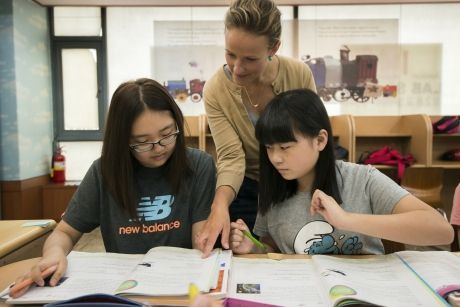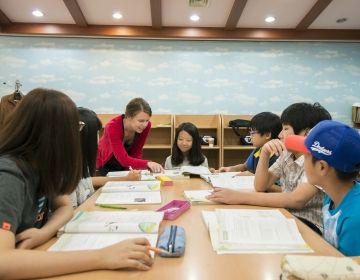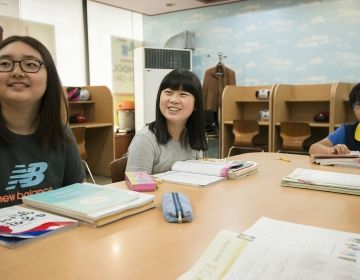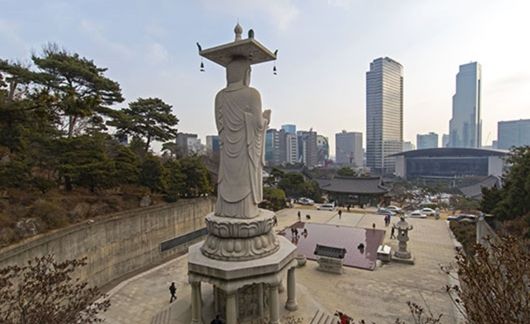
The Ultimate Guide to Teaching English in South Korea
South Korea is nestled on the southern portion of the Korean peninsula and is famous for vibrant Buddhist temples, striking mountain peaks, and miles of coastline. This densely populated nation is also home to exciting cities and delicious eats.
South Korea is an exciting teach abroad destination that boasts a modern culture and a deep connection to its traditional history.
Snapshot of Teaching English in South Korea
Avg. Salary: $1,500-$2,500+/month
Teaching Hours: 20-25 classroom hours
Duration of contract: 12 months
Peak hiring season: February and August for EPIK, year-round for private academies
School term: March to mid-July, and end of August to mid-February
Visa requirements: E-2 Visa applied for before entering South Korea
Why Teach English in South Korea?
South Korea is a popular place to teach English for many reasons. First, teaching jobs in Korea are some of the best-paying ESL jobs globally with the most relaxed job requirements. Second, ESL jobs in Korea often include excellent benefits like free furnished housing, reimbursed airfare, and national health insurance.
Not to mention, many teachers who move to South Korea find the culture easy to adapt to and a high standard of living that allows for frequent travel and entertainment.
Read More: Is Teaching Abroad Alone Safe for Women?

Typical Requirements to Teach English in South Korea
In order to teach English in Korea, you must first confirm that you’re eligible. The main requirements are:
- Be a native English speaker from the U.S., U.K., Canada, Ireland, Australia, New Zealand, South Africa, or India
- Hold a bachelor’s degree in any field
- Have a TEFL certificate of 120 hours or more
- Proof of a clean background check
Types of Teaching Jobs in South Korea

EPIK Program
EPIK, or the English in Korea Program, is a government initiative that hires native English teachers to teach English in public schools across the nation. EPIK teachers work alongside Korean co-teachers to lead classes and are contracted to work 40 hours a week, with 22 hours a week of actual teaching hours. Applicants can only list one placement preference, which means it's not uncommon for EPIK teachers to teach in rural parts of Korea.

Language Academies (Hagwons)
Studies are taken quite seriously in Korea, so much so that many students continue studying at private academies called Hagwons after their normal school day. These private schools contract hagwon teachers to tutor children on nights and weekends. Hagwon jobs typically offer fewer benefits but provide greater freedom in choosing where to teach in Korea.

International Schools
International schools in Korea also hire native English speakers to lead various subjects or grade levels. International schools require teachers to have a degree in education, a teaching license, and some teaching experience. These jobs are best for establishing a long-term career in South Korea.
ESL Jobs in Korea: Teach Abroad Programs and Job Boards
Once you decide which ESL job in Korea is right for you, it’s time to start job hunting and apply to your program of choice.

CIEE Teach Abroad
One fantastic way to teach English in South Korea is through the CIEE Teach Abroad Program. The program includes CIEE TEFL's flagship 150-hour TEFL course, access to an expansive network of hiring private academies (hagwons), pre-departure assistance, and one year of iNext international insurance, amongst other perks! CIEE Teach Abroad also helps those who are wanting to apply to the EPIK program. Applying to EPIK is a complicated and competitive process, but CIEE's support helps ESL teachers turn in strong applications.
It's also possible to apply to the EPIK program independently. The application process can be found on EPIK's official website.
Learn more about the CIEE Teach Abroad Program in South Korea.

Dave’s ESL Cafe
Dave's ESL is a comprehensive resource that helps ESL teachers find jobs, network with other teachers, plan lessons, and more. It also offers one of the largest ESL job boards in the world, where hiring schools advertise current openings.
Before committing to a hagwon position found online, be sure to check reviews and the Korean Black List website to ensure it's a trustworthy institution. Unfortunately, not all hagwon positions in Korea are created equally.
Frequently Asked Questions
You’ve got questions. We’ve got answers.
Many teachers dream of experiencing life in Seoul, Korea's uber-modern capital city. But placement in Seoul can be competitive, and there are plenty of other amazing places to teach in Korea. These popular places to teach in Korea also offer the most job opportunities for English teachers.
Seoul/Seoul’s outskirts: Korea’s capital city is home to over 9 million people and is famous for towering skyscrapers, a fast-paced lifestyle, and important cultural landmarks. The city has many teaching positions, but competition is very high. Alternatives to Seoul are surrounding cities like Incheon, Suwon, and Anyang.
Busan: The country's second-largest city can be found along the southern coast and boasts sandy beaches, a vibrant arts scene, and colorful homes. Those interested in teaching English in Busan with EPIK need at least a 50-hour TEFL practicum.
Daegu: Located in the center of the nation, Daegu is in an excellent spot for exploring the country and has a large expat community.
Jeju: Nicknamed the "Hawaii of Korea," Jeju is a beautiful small island south of the mainland and is a popular vacation spot for locals thanks to its beaches and volcanic landscape.
One of the best ways to learn more about what it's like to live and teach in a destination is to read personal reviews. These blog posts share a bit of what life is like in Korea straight from ESL teachers who've been there and done that!
- 15 Pros and Cons of Teaching English with the EPIK Program by Life of Brit
- Private vs. Public School: Making the Right Decision for You by Laura S.
- Moving to Korea: The Ultimate Packing List by Two Wandering Soles
- 18 Things I Love About Living in South Korea (Benefits & Pros) by Torn Tackies
- South Korean Food: 45 of the Best-Tasting Dishes by Will Fly for Food
CIEE TEFL's 150-Hour TEFL Certification
CIEE TEFL is one of the best options for those dreaming of teaching abroad in South Korea. As an internationally recognized and trusted brand, CIEE has a proven track record of helping graduates successfully secure jobs teaching English in Korea through EPIK and private academies.
CIEE TEFL's 150-hour certification allows aspiring teachers to earn their training entirely online in just three months and checks all the boxes for what hiring schools in Korea are looking for:
- 130 hours of ACCET accredited coursework
- 20 hour TEFL practicum
- Instruction by highly qualified TEFL tutors
- Job search assistance
- Discounts are available for those who can demonstrate participation in the CIEE Teach Abroad program or EPIK
The average ESL teacher makes between $1,500 to $2,500 per month in South Korea, teaching for private language academies or public schools. Those with a teaching license can earn a higher wage teaching in international schools or at Korean universities.
Labor laws in South Korea dictate that employers must provide English teachers with health insurance, 50% pension contributions, and severance pay. As mentioned above, many jobs also provide teachers with free furnished housing as well as contract bonuses.
A teacher’s salary bundled with these additional perks and the reasonable cost of living makes Korea one of the best countries to teach English and save money.
Cost of Living in South Korea
The cost of living in Korea is generally lower than in the U.S., except in Seoul, which is the most expensive place to live in Korea.
Many teaching jobs in South Korea do include free housing so after factoring other basic needs, the cost of living in Korea is typically about $850-$1,000+ per month. If your teaching job doesn’t include free housing, you can expect to pay between $350-$650+ more in rent per month for a studio apartment in Korea.
To give you a clearer idea of the cost of living in Korea, you can see the average costs of necessities according to Numbeo, a cost of living database.

